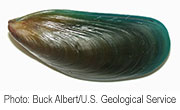
TUESDAY, Jan. 15 (HealthDay News) — The lowly — but very tenacious — mussel has helped researchers develop new medical adhesives for sealing surgical incisions and other wounds.
Mussels are able to stick to underwater surfaces such as rocks and ship hulls without being swept away by powerful waves or currents. They do this by producing a very powerful adhesive protein.
Scientists used the chemical structure of that protein to develop non-toxic synthetic adhesives that work well on wet tissue and have other qualities that make them better than current products such as fibrin glue and cyanoacrylate adhesives.
The new bioadhesives are called iCMBAs. The researchers tested them on rats, and their results were published recently in the journal Biomaterials. Experts point out, however, that results achieved in animal testing often are not duplicated in humans.
The iCMBAs had two and a half to eight times better adhesion in wet tissue conditions than fibrin glue. They also stopped bleeding instantly, promoted wound healing and closed wounds without the use of stitches, said Jian Yang, associate professor of bioengineering at Pennsylvania State University, and colleague.
Yang also noted that the iCMBAs are non-toxic and fully synthetic, which means they are less likely to cause allergic reactions. Side effects in the rats were limited to mild inflammation.
“We are still optimizing our formulation,” Yang said in a university news release. “We are still trying to make the adhesion strength even stronger” to expand its use for situations where strong adhesion is essential, such as treating broken bones.
More information
The American Academy of Family Physicians explains how to care for surgical incisions.

